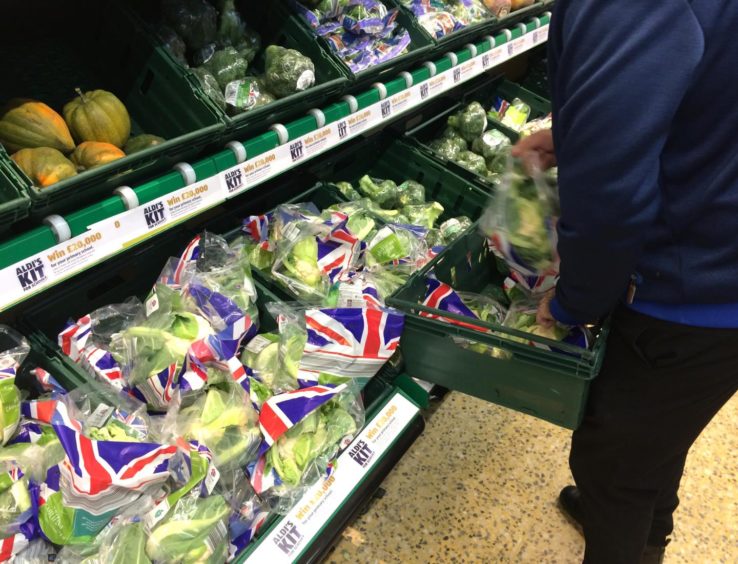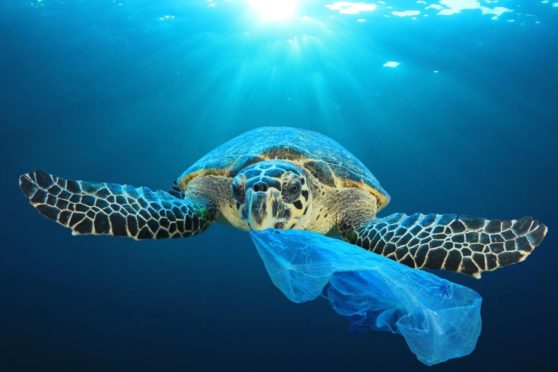Four years ago, Sir David Attenborough’s Blue Planet II shone a spotlight on plastic in our oceans.
From July next year, the deposit return system I helped campaign for will reduce the number of plastic bottles Scotland puts into the seas.
But almost no other change has been made since the programme aired.
So whose responsibility is plastic waste and pollution anyway?
To oversimplify matters, there are three main candidates: the public, businesses, and governments.
The case for the prosecution of the public is as follows.
We choose the overpackaged items off the shelves or off the websites.
It’s therefore up to us to exercise “consumer power” and pick more sustainable products, and we should do what we can to recycle. Businesses will then be forced to improve their ways.
Plastic is a business choice
But, business makes all the plastics that end up in our oceans and in the guts of everything from plankton to you and me.
And they choose what goes on the shelf, so let’s focus on them.
Protests outside their headquarters do have an impact, and they can be great fun too.
But persuading a single business to change won’t stick if another less reputation-sensitive business can just step in.
Governments regulate the corporations… That’s where the decisions are really made
Whether or not companies have to follow common standards is of course a matter for governments and parliaments.
Governments regulate the corporations who produce and sell plastics, just as they set the rules for oil exploration.
That’s where the decisions are really made.
Who to hold responsible for our ongoing environmental disasters isn’t some weary thought exercise, though.
Scotland’s deposit return system starts in exactly one year 🎉 so we have been out and about today to mark the occasion ⬇️♻️ https://t.co/lFCupDuDX7
— Have You Got The Bottle? (@yougotthebottle) July 1, 2021
It’s an area where large amounts of money have been spent over decades on a single aim.
To make you feel like it’s your fault.
This project began 50 years ago, just as environmental awareness began to go mainstream.
The first ever Earth Day was marked in the US in March 1970, just as the first “bottle bills” passed, using 5¢ deposits to bring back empties for recycling.
Stereotypes and snappy slogans
A year later an organisation called Keep America Beautiful put out an ad known as “the crying Indian”, featuring an Italian-American actor dressed in a stereotypical native headdress.
He canoes down a trash-strewn river into a polluted harbour.
A car driver throws a bag of rubbish at his feet, and the famous tear rolls down his face.
The punchline? “People start pollution. People can stop it.”
You’re meant to think it’s nothing to do with the packaging companies who set up Keep America Beautiful, of course, and unrelated to their burning desire not to be regulated.
Like their counterparts elsewhere, they redefined blaming the public as “education”, and they explicitly lobbied against bottle bills.
It’s the exact same trick BP used in 2004 when it produced the world’s first “carbon footprint calculator”.
Now you can work out exactly how much climate change is your responsibility, not theirs.
Make makers responsible
So what should governments be doing about plastics?
The answer is a principle known somewhat wonkishly as “extended producer responsibility”.
Whether product or packaging, if you make it, you’re responsible for it at the end of its life.
This already applies to some electrical products, and it’s coming for drinks cans and bottles through deposit return.
Our taxes pay for low-grade recycling, incineration, and avoidable street cleaning
The alternative, the world we currently live in, is zero producer responsibility.
It goes hand in hand with efforts to blame us – even though our taxes pay for low-grade recycling, incineration, and avoidable street cleaning.
It takes a lot of cognitive dissonance to stand in any supermarket and think a ban on plastic straws (which can be a medical device for disabled people) is the answer.
Almost everything in sight is wrapped in a layer of plastic, or more, and on the back it always says “film: not currently recycled”.

Supermarkets could very easily be selling coleslaw or bacon in standard sterile reusable packaging and taking the empties back.
Refilling laundry liquid bottles is currently a niche way to shop, but supermarkets could be offering it as standard.
The pandemic could have been a perfect time to change food delivery forever. Regulate for a small range of standard washable container sizes, charge a deposit on them, and then credit the customer for every one returned.
Plastic waste is not our fault
Don’t let them blame you for the world we live in.
Say no to the guilt. It’s designed to demoralise.
Instead, write a fierce letter to the supermarkets and the manufacturers, or join one of the many good organisations which pressure them on our behalf.
Urge your politicians to act too.
There’s a much-delayed circular economy bill coming. But in the last Holyrood session the SNP published a draft which included no actual circular economy measures.
Perhaps the next version could actually deliver?
That is, in part, in your hands. You have power as a citizen, not a “consumer”. Use it.
James Mackenzie is a freelance media and public affairs consultant and former head of communications for the Scottish Greens.

